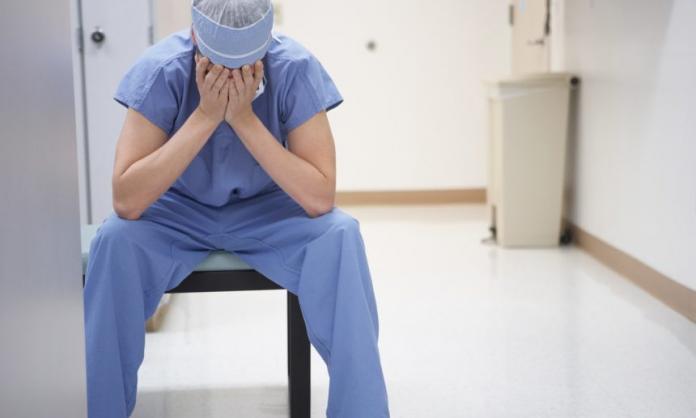Remember the COVID mental health crisis of 2021? Such was its magnitude that the Business Council of Australia, never before (or since) interested in anyone’s mental health, issued a statement in September about Australia’s “mental health emergency”.
Mental health and the crisis of it were on the lips of almost every organisation that was campaigning against public health measures to contain the virus. The Herald Sun in Victoria ran countless articles highlighting the strains that lockdowns in particular were causing children and high school students.
While the strains were often real, the political right never argued for more social support to ameliorate the hardships caused by strict COVID public health measures—they just argued by implication that the medicine was worse than the disease.
But the evidence coming out of the United States and other countries was clear: the disease was much worse. And it wasn’t just the hundreds of thousands of deaths, but the millions of people who lost friends and loved ones.
“You think about the holidays that are behind us that 140,000 children in the US losing a parent or grandparent—what a different holiday season this was”, Christopher Russo, a doctor, told a journalist from the NBC-affiliated 8WGAL in Pennsylvania in late December.
And there reportedly is a genuine crisis of mental health among children who have caught the disease.
“Although the symptoms of COVID have been mild, the effects that it has had on children's mental health has been severe”, Russo said. “We’ve seen a rise in teenage suicide attempts, particularly among girls, and a rise in hospitalisations for mental health reasons in the adolescent population, markedly during the COVID pandemic.”
On this mental health crisis there was deafening silence from those who purportedly were so concerned about mental health in Australia. Now the Liberals and the business lobby have gotten what they wanted: fewer restrictions and a lot more virus. But they have gone silent on the crisis that has resulted. A New South Wales emergency nurse writing in the Guardian today captures the scope of the catastrophe:
“‘Our healthcare system remains strong’, says our premier. It’s hard to explain that to the 91-year-old woman who slept in a chair last night in the emergency department I work at. Or the patient with cancer, receiving chemo, stuck at the cancer treatment centre for more than 24 hours, her journey delayed because she became a close contact while waiting for a bed.
“The patient with suicidal ideation, who has been scheduled under the Mental Health Act, was told they have COVID-19, and is being forced to wait indefinitely for days as there are no beds at the specialised mental health facility ...
“We feel defeated: we are not able to provide the level of care we could pre-pandemic. What is most wearing, though, is the lack of recognition from our leaders about how hard this pandemic is for the nursing workforce ...
“We have already lost so many of our best senior nurses and paramedics over the past few months due to the fatigue of this pandemic. I just know that with this fourth wave of infections, we are going to lose many, many more. My colleagues and I are beyond fatigued. We feel hopeless, we feel scared. There is nothing left for us to give.”
Where’s the press release from the Business Council demanding something be done for the sake of nurses’ and patients’ mental health? There isn’t one, because the capitalists have their freedom back—the freedom to make money at the expense of our safety and health. No more of those pesky lockdowns, border closures and mass public health measures that were our defence against mass illness and the mass suffering that comes with it.
Across Australia this week, news headlines are screaming that health workers are burned out, that hospitals are overwhelmed and dangerously short staffed and that people are going to die as a result. The Australian Medical Association is saying it, epidemiologists are saying it, the nurses’ union is saying it, aged care providers are saying it.
There have been reports of older and sick people passing out in hours-long queues in the heat waiting for PCR tests, not to mention sick babies and children waiting in lines in the heat. The most vulnerable members of our community—including Indigenous communities, people with disabilities and older people—cannot access or afford RAT tests, major COVID testing sites are shutting down because of overload and COVID positive cases and hospital admissions are rising fast.
ABC News reported at the end of December that doctors are reporting a “wave of patients” who are “sick with worry”. “Anxiety around catching and passing on COVID-19 is well known, but GPs are now warning of alarming levels of fear in the community”, the report noted.
It sounds like something approaching a mental health crisis. So where is the campaign from the Murdoch press and the Liberal Party to do something to address the source of it?
Those of us who work in the mental health sector, or in social services and health, are hearing and witnessing horrendous stories and incidents every day. Going to work, you have to brace yourself for helplessness and despair, knowing there will be very little you can do for people in deep crisis because our underfunded and privatised or corporatised systems of care were already broken prior to the COVID outbreak.
The federal government threw millions of dollars at telehealth mental health counselling lines last year. While telehealth has been valuable for a range of people, it is well past time to call bullshit on the government’s approach: overseeing the wholesale erosion of genuine mental health, health and social services while making a big show about funding call centres such as Lifeline or Beyond Blue or 1800RESPECT.
What we cannot do from the other end of that telephone line is give you money to buy food for your kids, or pay your rent or mortgage if you’ve lost income because of being away from work sick without COVID sick leave, find you a safe refuge if you’re fleeing domestic violence—because state and federal governments have shut them down—find money to pay for the care your kids with disabilities need because the NDIS has cut you off, or find care for your elderly parents who are dying waiting for a My Aged Care package or a place in a residential home.
And what we’re very unlikely to be able to do is find you adequate mental health care—because the public mental health system in Australia is a basket case. If you can afford private counselling, good luck finding a specialised therapist. So many of them have closed their books for months because of the overwhelming need.
Right now, the mantra from governments is to “take personal responsibility” as they relinquish responsibility for public health, for providing people with adequate welfare and guarantees around housing and income support. Governments are encouraging everyone to trust the capitalist market to solve our health care needs. Yesterday, Finance Minister Simon Birmingham’s advice for people who can’t obtain unavailable PCR and RAT tests was to be “agile”. Maybe we are supposed to just try to outrun the coronavirus now.
We’re in survival of the fittest—or the wealthiest—mode when it comes to the pandemic. That’s exactly how the people at the top want it—everyone fearing for their or their family’s health and being grateful when a $10 test kit becomes available. The cure for this ill is to organise however we can, to fight them tooth and nail for every protection we can get.









